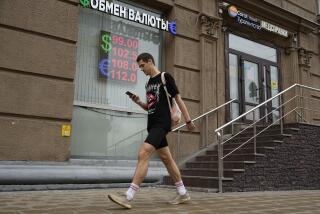Sell-Off Sends Euro to Record Low
- Share via
Currency traders dumped the euro Wednesday, driving the Continent’s common currency to record lows against the U.S. dollar as fears spread that European politicians were at odds with the European Central Bank over monetary policy.
The euro plunged below 87 U.S. cents for the first time, with analysts speculating that it could tumble to as low as 80 cents or even 75 cents over the next few months--adding to the Continent’s embarrassment over a currency once heralded as a rival to the dollar.
“No economist can say how low it can go, but we all agree it’s in overshooting territory now,” said Stefan Schneider, chief euro economist at Deutsche Bank.
In New York trading, the euro was worth 87 cents, down 2.1 cents from Tuesday after falling as low as 86.87 cents. The euro also fell to a new intra-day low of 91.85 yen.
The sell-off also engulfed other currencies, including the British pound, which fell to a seven-year low against the dollar.
Traders have been balking at comments by German Chancellor Gerhard Schroeder, who said earlier this week that he wasn’t concerned about the euro’s steep decline because it helped make German products cheaper overseas.
Europe’s central bankers have consistently warned that a weak euro is fueling inflation across the Continent because it makes imports relatively more expensive. The ECB last week raised its key short-term interest rate, the sixth increase since November, in part to fight inflation.
But Schroeder’s comments also conflicted with those of other European leaders who consistently say that the euro is undervalued.
Schroeder backtracked a bit late Wednesday, saying “The current trend is unpleasant, but the economic power of Germany and Europe is so strong that sooner or later markets will react to it.”
Schroeder’s comments, made between sessions at the United Nations millennium conference in New York, lifted the euro briefly, but it wasn’t sustained in early Asian trading today.
Economists speculated that Schroeder’s original comments were directed at soothing the concerns of unnerved German citizens who have lost confidence in their new currency after watching its continuing tumble.
But money traders latched on to the remarks as an indication that leaders are unconcerned about the slide and that the ECB, while raising interest rates to support the currency, is unlikely to intervene directly and buy up the euro.
The euro’s latest slide also underlines the fact that the European economy--while rebounding--is still playing catch-up to the robust U.S. economy. That is causing money to flow out of Europe and toward U.S. investments.
At the same time, the plunging euro has made it cheaper for Americans traveling in Europe and buying European products.
*
Reuters was used in compiling this report.
(BEGIN TEXT OF INFOBOX / INFOGRAPHIC)
Pounded Again
The euro’s value plunged to a new low against the dollar Wednesday, dragging the British pound--which is not a euro-zone currency--down with it.
*
Euro
Monthly closes and latest, in U.S. dollars
Wednesday: 87 cents
*
British Pound
Monthly closes and latest, in U.S. dollars
Wednesday: $1.44
Source: Bloomberg News
More to Read
Sign up for Essential California
The most important California stories and recommendations in your inbox every morning.
You may occasionally receive promotional content from the Los Angeles Times.













